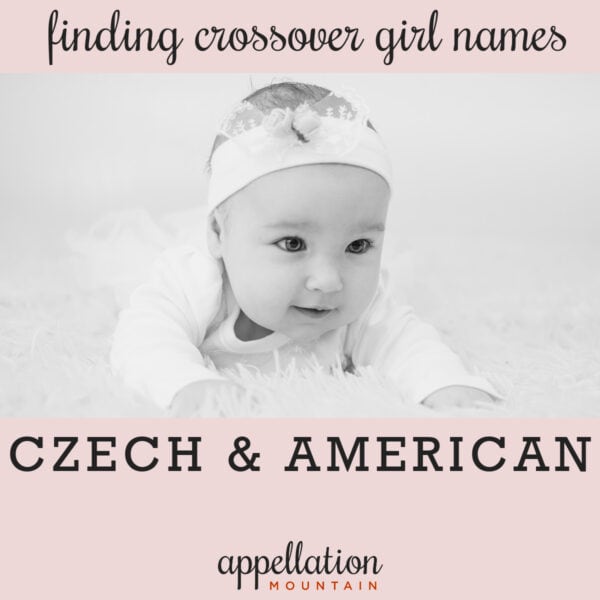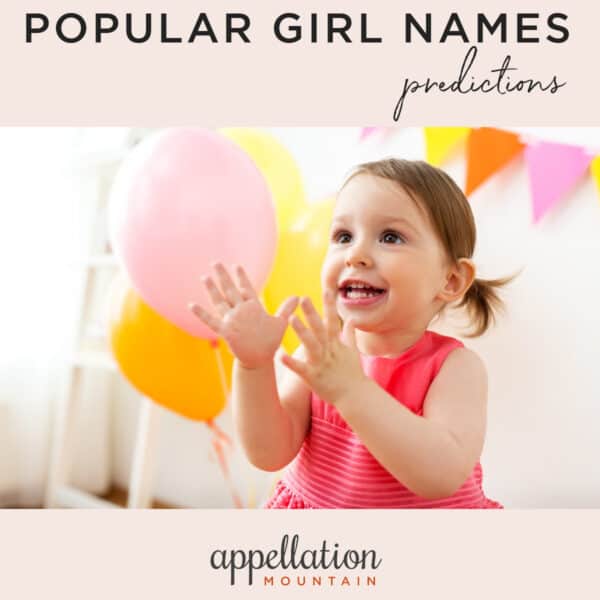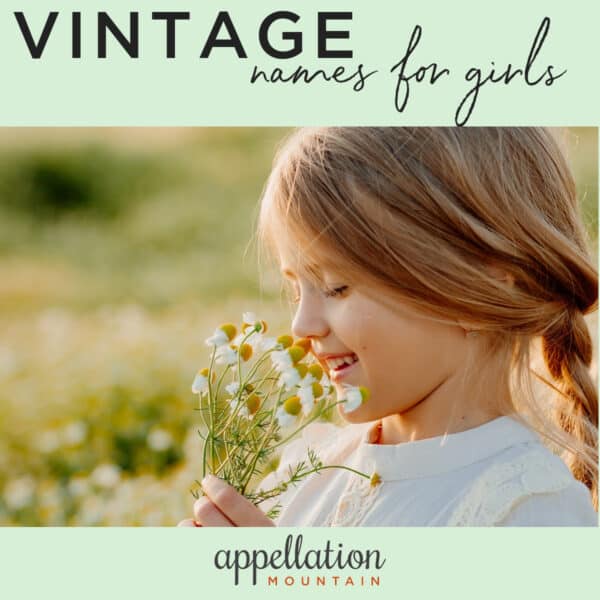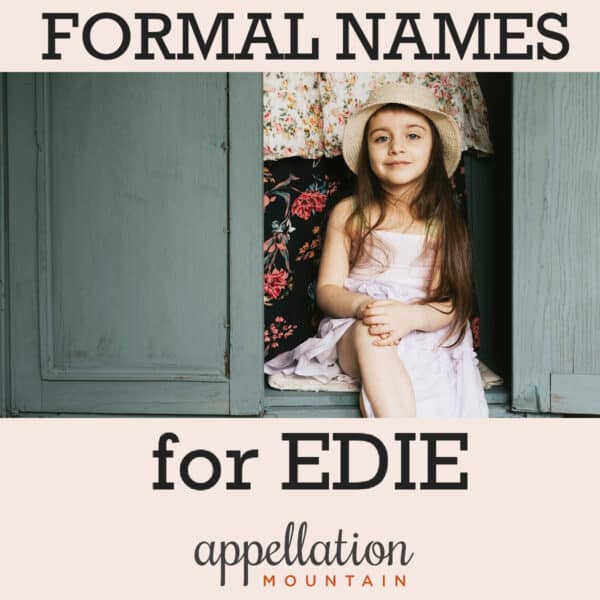
Thanks to Kayt for suggesting our Baby Name of the Day way back when, and to Leigh for requesting an update!
MUSICAL SURNAME NAME
Once upon a time, the baby name Harper started out as a surname.
Most Harpers likely worked as court musicians.
Harps date back to the ancient world. They made a splash in the medieval era, particularly in Northern Europe. Troubadours played harps as they told their tales. (And yes, harps were smaller back then.) So no surprise that the occupational surname Harper evolved, right alongside Miller and Carter.
TWO TRENDS MEET
Like nearly any surname, Harper was used in small numbers for children over the years – likely because it was a family name for many.
The musician Paul Simon named his son Harper in 1972. Harper’s mom was Simon’s first wife, Peggy Harper.
The runaway success of surname names for girls started with Taylor in the 1990s. Then came Madison, early in the 2000s. Along with Jordan, Morgan, Mackenzie, Kelsey, Shelby and more, the door was wide open for Harper.
We’ve also embraced musical names for girls over the years. Melody, Cadence, Harmony, and Lyric have all had their moments.
The baby name Harper sits at the intersection of both trends.
Maybe there’s even a third factor: since harps are associated strongly with Ireland, Harper might appeal to the same families who previously pushed Erin and Kelly – speaking of surnames – to the top of the charts.
By the 1990s, a growing number of girls and boys alike had received the name.
LITERARY HARPER
One of those children to receive the family name Harper? The future bestselling author, Nelle Harper Lee.
Lee’s first name was inspired by her grandmother, Ellen.
When she published To Kill a Mockingbird in 1960, she used her family middle as her pen name.
The book won a Pulitzer, and inspired a 1963 movie, a cinematic classic; Gregory Peck won the Oscar for his portrayal of Atticus Finch.
Of course, Harper has other associations with print and the written word. Since 1867, Harper’s Bazaar has been published in the US, a fashion magazine with global reach. Publisher HarperCollins also combines nineteenth century roots with international renown.
As for the novel? Despite finding resounding success in the 60s, it would take decades before Lee’s story would inspire parents.
THREE MORE DECADES
The baby name Harper didn’t catch on for ages.
Paul Newman played a private detective named Lew Harper in two successful movies: 1966’s Harper and 1975’s The Drowning Pool. It didn’t move the needle on the number of boys given then name.
In 1968, Jeannie C. Riley scored her first-ever hit with “Harper Valley PTA.” The song raced up the country and pop charts at the same time, back when crossover songs were a rarity. The song chronicled a small town conflict between uptight community leaders and a carefree single mom. It inspired a movie and a television series.
While a character with the surname Harper eventually appeared, it wasn’t a given name at that point, either.
Valerie Harper became a major television star in the 1970s, graduating from The Mary Tyler Moore Show to Rhoda.
Tony Kushner’s 1993 play Angels in America did give the name to one of the female characters, and might’ve inspired a very few parents – but only a few.
ONE CITY ONE BOOK
Beginning in the late 1990s in Seattle, a grassroots movement developed into the the One City One Book campaign.
The premise: What if everyone – book clubs and independent readers, discussion groups and civic organizations – all read the same book at the same time, and then talked about it?
Mockingbird was a popular choice, picked for its focus on race, justice, and personal courage.
By the early 2000s, plenty of future parents had discovered the book on their required reading lists as students. But as they rediscovered it as adults, it seemed to put the baby name Harper on more and more families’ shortlists.
Plenty of parents have cited Mockingbird as the reason for their choice, including David and Victoria Beckham. Sales of the novel surged in the UK after the famous couple announced their daughter’s name in 2011.
More proof that the reading campaign made an impact? Atticus, the name of the main character, caught on alongside Harper.
BY the NUMBERS
Dozens of celebrity parents chose the baby name Harper over the years, from Shonda Rhimes and Neil Patrick Harris to Dave Grohl and Lisa Marie Presley.
In 2004, Harper debuted in the girls’ Top 1000 at #887.
It rocketed up the popularity charts in the US, reaching #54 by 2011.
And in 2015? It arrived at #10.
The baby name Harper has bounced between #9 and #11 ever since. It currently sits at #10 as of 2020.
TAILORED AND PRINCIPLED
Harper’s image is tailored and principled. It’s a modern name with strong, positive associations – from Lee’s novel to the instrument.
As a Top Ten name, it’s also become too popular for some parents to consider. But overall, the baby name Harper makes an appealing choice, rich with meaning.
What do you think of the baby name Harper?
This post was originally published on June 3, 2008. It was revised and re-posted on June 18, 2012; February 8, 2016; and again on February 15, 2022.





There’s a family here who have a daughter named Harper who must be about 13 or 14 now. She has older sisters who both have trendy H names that were more popular at the time. They must have been ahead of the trend when they named her.
Names like Harper used to be used to honor/carry forward a family name. The last name of an ancestor or at least of an admired person whom you feel connected with.
I guess like boomer to millennials, today’s parents think names of this type along with other weird types of names sounds to the prospective parents ears, as classic, upmarket , or “upper class” in some sort of way,
Quite the contrary in reality they just aren’t. Unless there are Harpers in the family, these names mostly have opposite desired effect as a name.Along with the awful modern idea of giving
a child an odd name like Luna or Kolton to announce to the world at large of the “specialness/uniqueness “ that parents seem to think is necessary to convey to the larger community to let us know just how “special “ and one of a kind their particular child is.
Or giving a child only a nickname (say, a baby w/ a name like
“Jake “as the only formal name instead of “Jacob “ or Jake“ or better still an informal name being spelled like “Jayke ” —a good nickname…. minus the “y” …but, a name that Jayke can use when he becomes an adult bank
manager—“would you really feel more comfortable turning your money to be managed by A “Jayke” or or his truly adult and full name of Jacob?
Why would anyone want to use a last name that they have absolutely no family connections with or some shaky sounding name like River?
Using someone elses surname/last name) Like Peyton, Parker, Taylor, when it does not come from their own family or at least someone they have an admiration or connection too, just seems
to people who use family names to be disingenuous . Trying to claim
something “higher” but instead
really looks/feels decidedly down market instead of having the desired
effects that parents are trying to
for.
I actually have a small child cousin who is named Luna and it sounds like a pet’s name. If parents want to give their child a strong name that they can carry them through adulthood and be a
true help to a child once they need their name for a business card—please , Mary Elizabeth Stanton just has an enduring appeal, rather than River Luna Stanton or some such nonsense imposed in the name of appealing to the child’s parents an idea that every child is
so very “unique “ and we must overtly tell the rest of the world instead of having individuality come through in achievement and development of a child’s daily character.
Really , as a 63 year old who was one of 18 grandchildren, trust me, I worked with200 children for 5 years in summer while in college—-they are individuals of course, but honestly, most are just your pretty
normal little folk with some variations in physical beauty and intelligence. Most of us are just normal, only seen as super -unique to their parents and a few others like their grandparents.
When you are 1 of 18 grands, you grew up “among the common” and that was , for the most part , good enough. Beyond the 1st grandchild in my family, we were all treated well, we were close as cousins.
So many of today’s children are treated like little “household gods” as they are today in the home where they are treated as “de facto household gods” as many children from Boomers through Millenials
we’re considered to be. Your birthday was your “special “ day, but as for the remainder of the year, you were one of the group.
Along w/other trendy names that are used to denote a more “upperesque” feel, at least for my generation these odd name trends began with the 1980s, Jennifer and Jason’s, and expanded to through the 1980s with “soap opera” names like Trey, Blaine, Ashley and all its derivations, including the
previous to current generation’s use of “Brittany” ( a French place wordmeaning “Little Britain” and I can tell you from my visit there that Brittany
is a geographic region of France that was many hundreds of years ago by people who had common ancestry w/their kin in what is now England/UK.
But, many adults who name/named their child this particular name, like so many others— end up w/ Britney, Britanee or some tacky spelling of a name /place that they know nothing about.
So, if you really want to be considered as tasteful parents , try naming your daughter Caroline Elizabeth rather than Parker Luna , and you will be cutting-edge for sure. Save Willo or Willow, or Teagan for the cat. Seriously y’all. Or name your child in some way for their very own ancestors.
And, you can always give a child 2 middle names, such as Caroline Smith Ferguson Harper. Looks upscale, pays honor where it is due and it is very acceptable to be Caroline S.M. Harper, and who knows, Baby Caroline has the name that will be great when she becomes President.
Typically I delete all mean-spirited comments without a second thought.
But I’m going to respond to this one, because I’m not sure if it’s intentionally mean-spirited or mostly misguided. And I do think others may feel the same way you do, Kath.
In fact, I might have agreed with you, at least a little, at one point.
But here are a few things your argument overlooks:
First, names have always trended in and out of favor. Often we think of certain names as traditional, but they’re not really. Samantha is a relatively modern innovation. Names like Ryan, too, would have been rare, even weird, a century ago. There’s really no such thing as a normal name.
Back in the year 1900, Luna ranked in the US Top 1000. Lisa did not. Neither did Carla/Karla, Gavin, or Jeremy. I could go on – and could easily do the same for any year or decade. While few would argue with some of the names you’ve mentioned, like Mary and Elizabeth, they are the exception.
For the most part, we freeze our idea of “normal” based on our generation and the specifics of our experience – our socioeconomic background, education level, and so on. It’s not wrong, exactly. But it’s not a universal truth, either.
Second, the idea of names evolving tracks with how we live and speak. The linguist John McWhorter of Columbia University has famously described language as a parade:
“Language is a parade, and nobody sits at a parade wishing that everybody would stand still. If the language stayed the way it was, it would be like a pressed flower in a book, or as I say I think it would be like some inflatable doll rather than a person. I think that it’s better to think of language as a parade that either you’re watching or, frankly, that you’re in, especially because the people are never going to stand still. It’s never happened, it’s never going to. And if you can enjoy it as a parade instead of wondering why people keep walking instead of just sitting on chairs and blowing on their tubas and not moving, then you have more fun. I want everybody to have the fun I’m having.”
Here’s an interview where he said it – though it’s an oft-repeated concept he uses..
We should expect and invite and enjoy the evolution of language – which includes personal names – rather than try to freeze it at some moment of our personal choosing.
Third, and I’ll try to say this gently – don’t you think that maybe there are some lovely people who named their children Britney for reasons that aren’t readily apparent to you, but are no less real and valid to them? While your comments may have been motivated by sincere concern for a child’s future, they sound, well, snobbish.
And maybe, if you’re a Jamaican American woman married to a Honduran American man, names like Caroline feel completely inappropriate. Like you’re denying every bit of your culture and heritage to choose the blandest name possible?
Another reality: you’re correct that there are lots of examples of cultures that prioritize naming a child after family members, loved ones, or other significant figures in the parents’ life. But those aren’t the only customs and traditions. And some perfectly valid customs can lead to names that I think you might dismiss as tacky.
I’m in my 40s. My son’s orthodontist is named Brandon, which surprised me because Brandon was the name of the cute boy on 90210 when I was (much) younger. My husband has a (highly educated, very intelligent, professionally successful) colleague named Kayla, which was the ultimate soap opera name for my generation, thanks to Days of Our Lives. They’re good reminders that all names grow up. Today’s generation of Lunas and Harpers and Aidens will someday be the mechanics that fix my flying car and the hospice nurses that see me out.
But when it comes to names that really are different – statistically speaking, not just based on my judgement or yours – well, they’ve always been with us. Think of the cast of Hamilton, all named for historical figures. Sure there are men named Thomas and women called Elizabeth. But there’s also Hercules and Theodosia.
Fourth, it’s not just language changing. It’s the world! You mentioned Caroline being president some day. But the woman currently closest to becoming president is named Kamala. A gorgeous name, rich with significance. But not one that feels particularly classic, at least not in American English. The female justices of the Supreme Court have had classic names, like Ruth, but also trendy ones, like Amy and Sandra. It’s not about the names. It’s about how narrowly we have drawn our idea of who is qualified to hold office.
Lastly, regarding the idea that names reflect a defect in how we parent today? I just don’t see it. I’m old enough to know a range of parents – some whose children are now adults, some whose children are still infants. There’s such a wide range. I know relatively conservative parents whose kids have pretty unusual names, as well as those who stick to the classics. Some of the most progressive, world-changing people I’ve met choose relatively conventional names for their kids. And I would say that split is true in lots of other ways. I really don’t know many parents who treat their children like little rock stars. And even the ones I know who strike me as relatively indulged? They’re no more likely to have truly unusual names than their less pampered counterparts.
So what does matter? While there’s no American equivalent, UK data is broken down by mother’s age. This chart is from England & Wales, but I know there’s something similar for Scotland. Generally, younger mothers choose relatively trendier names, while older parents stick closer to the classics. But even within the classics, some names are more popular than others. Thomas and Florence are having a moment with older mothers (mums?) but not really Daniel or Elizabeth.
While I suppose some parents might choose quickly and with little thought, that’s just NOT the norm. Nearly every parent I’ve ever spoken to about names or every person I’ve asked about their given name – which must now number in the several thousands – has a story to share. They’re fascinating! They’re involved and funny and touching and sometimes sad.
We can like the names we like and name our children accordingly. But to pass such harsh judgment on others’ preferences? It requires overlooking the realities of history, language, and culture to impose our relatively narrow worldview on, literally, every other parent in the English-speaking world.
And that’s not something I want to encourage.
Hi there
Just thought I’d let you know that the harp picture was made by my Italian Grandfather that came to Dublin in the 30s there’s two of these harps something he replicated often in his designs throughout Ireland, nice to see it here too
I have a friend with a lovely toddler named Harper. She calls her daughter Harpy. I think my friend might not know what “harpy” means and I don’t want to be the first one to tell her…
Harper has always brought to my mind both “harpy” and “harping” (as in complaining), so it’s a hard name for me to get behind. I like the visual imagery of the harp and I have a general fondness for both H names and for occupational names, but “harpy” and “harping” are used regularly where I live so there’s just no way for me to break the negative association.
I think that’s the danger with parents who think they want nickname-proof names until their little one is actually here. It is easy to say, in theory, that you don’t like nicknames. But what we often mean is that we dislike our adult nicknames – we prefer William to Billy, or James to Jim. But when you’re confronted with a bitsy baby or a chubby toddler, it can be easy to see that their formal adult name isn’t going to fly for at least a few more years … and then the kids have a way of inventing their own names, too. My 3 y.o. daughter has a classmate named Zoe who answers to Zo-Zo, thanks to some of the other kids in her class back when they were learning to talk!